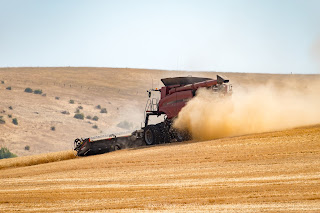Amber Betts
WSDA Communications
 |
| Agricultural work can be a high-stress occupation. |
When your livelihood is dependent on weather temperature,
precipitation, feed prices, market demand for your product, and many other
facets that effect the price of your product, it can be tough.
Farmers and ranchers have to almost predict the weather and
the market, ward off pests, keep their workers safe, and still try to make a
living, all while planning for contingencies. That’s likely why the suicide
rate among ranchers and farmers are higher than the national average, according
to the CDC.
Signs of suicide risk
September is National Suicide Prevention Month. September
5-11 was Suicide Prevention Week. During these observances, mental health
advocates, prevention organizations, survivors, allies, and community members
unite to promote suicide prevention awareness.
The Washington State Department of Health says there are a
few signs that may indicate your loved one is having suicidal thoughts: if one
starts talking or writing about suicide or death, feels hopeless, or like a
burden, or begins giving away their prized possessions. There may also be cause
for concern if your loved one is saying goodbyes, or stockpiling pills,
isolating from others, acting recklessly, or a loss of interest in favorite
activities. Read about more signs
of stress and warning signs your loved one may be at risk for suicide, and
what you can do to help.
Grant
Given the seriousness of this issue, WSDA recently applied
for and received a $500,000 grant to support the Farming Stress and Suicide
Prevention Project. WSDA will administer the funds and work in partnership with
the Washington State Department of Health and Washington State University
Extension. The project’s intended purpose is to expand rural community-based
education via trainings, resiliency workshops, and public awareness campaigns
to combat the stigma around behavioral health, and connect specific stressors
with behavioral health risks.
What can I do?
The National Action Alliance for Suicide Prevention
says there are several things you can do and say to be there for your loved
one, friend, family, neighbor, even a client or an acquaintance you suspect
might be struggling.
Checking in on a friend by phone or text message to see how
they are doing can have significant impact to someone considering suicide.
Inviting your friend to meet for coffee, or to share a meal, or sending a
handwritten card are all ways to let someone know they are cared for, and bring
them beyond their feeling of hopelessness. If your friend or loved one is
struggling, share with them the National Suicide Prevention Lifeline Number
(800-273-8255), which provides 24/7, free, and confidential support. For
specialized care, military veterans may press ‘1.’ In addition, anyone can
contact the Crisis Text Line by texting HOME to 741741.
Being involved is simple, a short call, text, or even a note
can help refocus someone to what is good in their lives, help them realize they
can get through their struggles.
